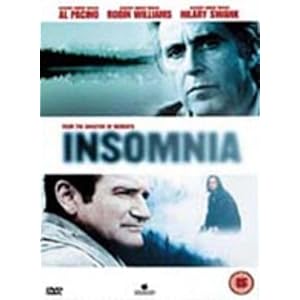Dir. Christopher Nolan
Starring: Al Pacino, Robin Williams, Hilary Swank, Maura Tierney
An adaptation of a 1997 Norwegian film, Insomnia could have been set nowhere else in the United States than Alaska Alaska Los Angeles
The city of Nightmute
The lack of sleep and the enshrouding fog would have provided mitigating circumstances for Eckhard’s death, except for one thing: he cannot guarantee that it was an accident. Eckhard, with his dying breaths, certainly thinks Dormer’s actions were deliberate. Both were under investigation by Internal Affairs back in L.A.
 |
| Losing his way: Detective Will Dormer takes a shot in the dark |
One of the introductory shots in the movie is that of a drop of blood hitting a shirt cuff. As soon as it makes contact it spreads, twining its way among the fibres. As with blood, so also does a lie spread and stain. Dormer’s framing of a suspect back in L.A. Alaska Alaska
I feel I have to point out that the depiction of the midnight sun is exaggerated for effect. I once spent midsummer in the backwoods outside Tampere , Finland
This is a great film, probably the one I’ve enjoyed most out of the five so far. It is reminiscent in some ways of the Hitchcock classic Vertigo. The story is a taut noir-ish tale where no one is innocent. Even Ellie’s presumed actions will destroy the reputation of a very good cop. The setting is integral to the plot. All the performances are superb, with Pacino thankfully dialling down the performance a notch and internalising his mental strain. Instead it is up to the production to suggest his altered mindset, with shifts in focus, strange angles, echoing sounds. And a big mention to Robin Williams as Walter Finch. He manages to portray the apparent normalcy and rationality of a deranged mind. Having also been a fan of his performance in One Hour Photo I have to say that I much prefer Williams creepy to zany.
What have I learned about Alaska
The people in Alaska Alaska
Can we go there?
Nightmute? Sure. It sits on Alaska ’s west coast on the Etolin Strait British Columbia , Canada . Squamish is much more densely populated and easier to access, being located half-way along the two-hour drive between metropolitan Vancouver Channel Islands whereas Nightmute is at the same latitude as the Shetlands. The fictional Nightmute seems a lot larger than the real one however – presumably artistic licence just because the city has a suitable name (in Nightmute the nights are themselves muted, in that they do not go dark). Hey, don’t blame me for trying to conjecture symbolism in names. I’m not the one who called the lead character, plagued by insomnia, ‘Dormer’ – which to my ears sounds suspiciously like dormire – ‘to sleep’ in Latin.
Overall Rating: 5/5
Overall Rating: 5/5

No comments:
Post a Comment